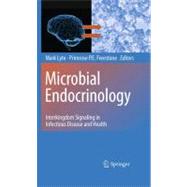
What is included with this book?
| Microbial Endocrinology: A Personal Journey | p. 1 |
| Evolutionary Considerations of Neurotransmitters in Microbial, Plant, and Animal Cells | p. 17 |
| Mechanisms by Which Catecholamines Induce Growth in Gram-Negative and Gram-Positive Human Pathogens | p. 53 |
| Dietary Catechols and their Relationship to Microbial Endocrinology | p. 69 |
| Interactions Between Bacteria and the Gut Mucosa: Do Enteric Neurotransmitters Acting on the Mucosal Epithelium Influence Intestinal Colonization or Infection? | p. 89 |
| Modulation of the Interaction of Enteric Bacteria with Intestinal Mucosa by Stress-Related Catecholamines | p. 111 |
| The Role of Microbial Endocrinology in Periodontal Disease | p. 135 |
| Staphylococci, Catecholamine Inotropes and Hospital-Acquired Infections | p. 151 |
| The Microbial Endocrinology of Pseudomonas aeruginosa | p. 167 |
| Mechanisms of Stress-Mediated Modulation of Upper and Lower Respiratory Tract Infections | p. 181 |
| Psychological Stress, Immunity, and the Effects on Indigenous Microflora | p. 191 |
| The Epinephrine/Norepinephrine/Autoinducer-3 Interkingdom Signaling System in Escherichia coli O157: H7 | p. 213 |
| Molecular Profiling: Catecholamine Modulation of Gene Expression in Enteropathogenic Bacteria | p. 229 |
| Microbial Signaling Compounds as Endocrine Effectors | p. 243 |
| Mycologic Endocrinology | p. 269 |
| Experimental Design Considerations for In Vitro Microbial Endocrinology Investigations | p. 291 |
| Index | p. 309 |
| Table of Contents provided by Ingram. All Rights Reserved. |
The New copy of this book will include any supplemental materials advertised. Please check the title of the book to determine if it should include any access cards, study guides, lab manuals, CDs, etc.
The Used, Rental and eBook copies of this book are not guaranteed to include any supplemental materials. Typically, only the book itself is included. This is true even if the title states it includes any access cards, study guides, lab manuals, CDs, etc.